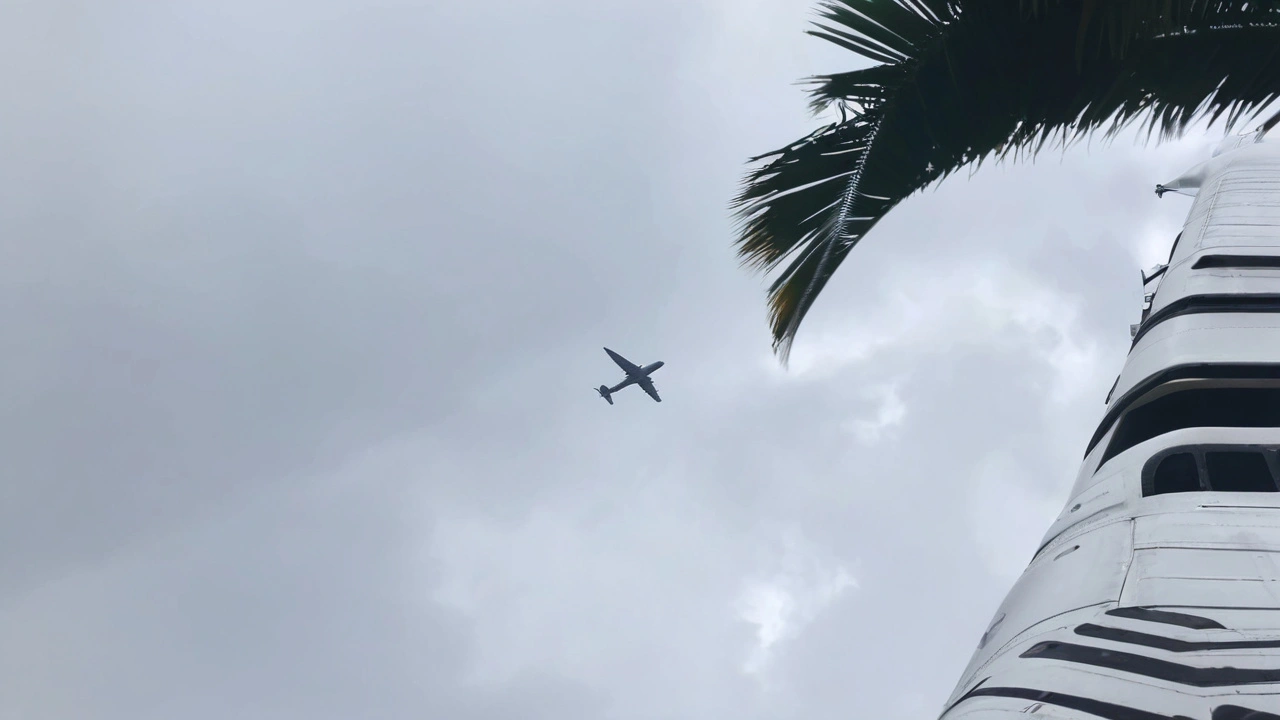Tragic São Paulo Plane Crash: All 61 Lives Lost as Investigation Unfolds

São Paulo's Devastating Plane Crash: Investigation Underway
In a somber turn of events, a plane crash in São Paulo, Brazil, has claimed the lives of all 61 individuals aboard. VoePass Flight 2283, operated by VoePass Linhas Aéreas, was on a scheduled route from Cascavel to São Paulo when it met with a disastrous fate in Vinhedo, a dense residential neighborhood.
A Scheduled Flight Turns Tragic
Flight 2283, an ATR-72 aircraft, was carrying 58 passengers, including families, businessmen, and holiday travelers, along with four crew members when it encountered fatal difficulties. Initial reports indicate the aircraft lost communication signals before diving rapidly into a grove of trees. The descent was followed by an explosive impact, which witnesses say created a massive fireball, wreaking havoc in the residential area.
The footage captured by onlookers reveals the harrowing moments of the aircraft's final descent. The crash site's proximity to homes adds to the catastrophe, as the explosion and subsequent fire spread to multiple residences, adding layers of complexity to the rescue and recovery efforts.
Immediate Response and Widespread Panic
Following the crash, emergency responders rushed to the scene. Seven teams from the São Paulo state fire department worked tirelessly amid the panic of the affected community. Eyewitnesses describe scenes of chaos and fear as residents grappled with the unfolding disaster. One local remarked, 'It was a moment of absolute panic in the city.'
The Brazilian President, Luiz Inácio Lula da Silva, confirmed the heartbreaking loss of life. In his public address, he requested a moment of silence to honor the victims, an acknowledgment of the tragedy's profound impact on the nation.
Investigations and Speculations
An investigation into the crash is ongoing, with aviation experts and investigators converging on São Paulo to determine the cause. Preliminary speculations suggest the possibility of ice buildup on the ATR-72's wings as a significant contributing factor. Ice buildup can lead to loss of control by affecting the aircraft's aerodynamics, a known risk in colder high-altitude flights.
This tragic incident marks a dark day in Brazilian aviation history, reminiscent of past aviation accidents that prompted significant changes in safety protocols. The current investigation's findings may have similar repercussions, ushering in new measures to prevent future calamities.
A Nation in Mourning
The crash of VoePass Flight 2283 has cast a pall of sorrow over the country. From social media tributes to silent vigils, the collective grief of those who lost family and friends is palpable. The pervasive sense of loss is compounded by the geographic reach of the tragedy: families and loved ones from different regions are mourning together, united in their shared pain.
As more details emerge, the global community watches with bated breath, hoping for answers that might bring some semblance of closure to those left behind. Brazilian Aviation Authorities have pledged transparency and thoroughness in the investigative process, emphasizing the importance of learning from this tragedy to enhance future safety.
Remembering the Victims
The identities of the 61 individuals lost in this disaster are slowly being released, painting a mosaic of the lives profoundly affected. Among the passengers were influential business figures, young children, and travelers taking what seemed to be a routine flight. Their departure highlights the unpredictability of life, as they leave behind families and communities grappling with unexpected grief.
The impact on local residents is also significant, as those whose homes were affected by the crash begin the process of recovery and rebuilding. Community support networks have sprung into action, offering a testament to human resilience and solidarity in the face of catastrophe.
Global Aviation Community Reacts
Reactions from the global aviation community have been swift and somber. Airlines and aviation bodies have expressed their condolences, while also emphasizing the importance of rigorous safety checks. The ATR-72, though generally a reliable aircraft, will likely face renewed scrutiny as experts analyze what might have gone wrong in this instance.
Globally, aviation safety protocols are constantly evolving, informed by both technological advancements and lessons learned from past tragedies. The São Paulo crash will undoubtedly enter the annals of such learnings, prompting discussions on best practices and perhaps leading to new regulations aimed at preventing similar occurrences.
The Road Ahead
For the families, friends, and communities affected by the crash, the road to healing will be long and arduous. Memorial services, support groups, and counseling sessions are being organized to help those grappling with loss find a way forward.
The Brazilian government has promised comprehensive support for all those impacted, including financial compensation and assistance in rebuilding homes. As the nation rallies together in support, this incident serves as a stark reminder of the importance of community and the shared humanity that unites us in times of trial.
As investigations continue, updates will be provided to keep the public informed. In the meantime, Brazil and the world mourn the tragic loss of life in São Paulo, holding the victims and their families in thoughts and prayers.






Cheryl Dixon
August 10, 2024 AT 21:23The sky, once a symbol of boundless freedom, now feels like a fragile veil over human hubris. When a plane meets tragedy, we are reminded that technology does not conquer nature, it merely dances with it. The loss of 61 souls is a stark testament to the thin line between routine and catastrophe, and we must question the complacency that pervades modern travel. Yet, amid the sorrow, there lies an uneasy curiosity about the forces we fail to grasp. Perhaps the real tragedy is not just the crash, but the silence that follows when we stop listening to the warning signs.
Ramesh Modi
August 14, 2024 AT 08:43Do you see the magnitude of this disaster?!! The heavens opened and swallowed an entire flight, leaving families shattered beyond repair!!! This is not a mere accident; it is a calamity that exposes the frailty of our engineered miracles!!! We must demand answers, not just condolences, and hold every stakeholder accountable!!! The world will remember this day as a bitter reminder that safety cannot be taken for granted!!!
Ghanshyam Shinde
August 17, 2024 AT 20:03The airline probably thought 'why not add a splash of drama to a Tuesday?'
Charlotte Louise Brazier
August 21, 2024 AT 07:23My heart aches for every family torn apart by this unimaginable loss. In moments like these, we must stand united, offering whatever solace we can to the grieving neighborhoods. Let us channel our anger into constructive pressure on regulators to tighten safety standards. The community of São Paulo deserves transparency, and we, as global citizens, should amplify their call for accountability.
SAI JENA
August 24, 2024 AT 18:43Esteemed readers, this tragedy underscores the imperative of rigorous adherence to aviation protocols. It is incumbent upon airlines, manufacturers, and oversight bodies to conduct exhaustive reviews of operational procedures. I urge all stakeholders to collaborate in a systematic audit, ensuring that such an incident is not repeated. Collective diligence will honor the memory of those lost.
Donny Evason
August 28, 2024 AT 06:03The crash in São Paulo reverberates far beyond Brazil's borders, touching every corner of the aviation community. From the bustling streets of London to the quiet runways of Delhi, we share a common sky and a shared responsibility. Let us seize this moment to foster cross‑continental dialogues on ice‑management training and aircraft certification. By weaving together diverse expertise, we can sculpt a safer future for passengers worldwide.
Hariom Kumar
August 31, 2024 AT 17:23Sending love and strength to all affected families 😊. Tragedies remind us how precious each breath is, and that together we can rise above the darkness. Communities will rebuild, and the spirit of resilience will shine brighter than any fire. Keep faith, and know that the world stands with you.
Phillip Cullinane
September 4, 2024 AT 04:43The VoePass Flight 2283 incident, while starkly tragic, serves as a textbook case study for multiple failure vectors in modern regional aviation.
From a systems engineering perspective, the confluence of environmental variables-namely sub‑freezing ambient temperatures and high humidity-creates a complex thermodynamic environment conducive to ice accretion on the ATR‑72's leading edges.
Such accretion, if not adequately detected by the aircraft's anti‑ice sensors, can alter the pressure distribution over the wing, precipitating a sudden loss of lift.
Compounding this, the flight's relatively short sector time may have limited the crew's opportunity to execute a complete de‑icing cycle post‑takeoff.
Operational protocols typically mandate a minimum interval between de‑icing and subsequent climb, but real‑world scheduling pressures often erode these safeguards.
The investigation will likely scrutinize the airline's Standard Operating Procedures, specifically the adherence to Checklist Item 3.2 regarding ice detection.
Moreover, the human factors dimension cannot be overlooked; crew resource management (CRM) dynamics and situational awareness under time constraints may have contributed to delayed decision‑making.
Recent research published in the Journal of Aviation Safety highlights that even seasoned pilots can succumb to confirmation bias when environmental cues are ambiguous.
Regulatory oversight agencies will also examine maintenance records to verify whether the aircraft's pneumatic anti‑ice system was fully functional and properly logged.
In parallel, the manufacturer may be called upon to reassess the thermodynamic modeling used in the ATR‑72's certification envelope, especially concerning low‑temperature operations.
The ripple effects of this accident will inevitably permeate into airline fleet planning, potentially accelerating the retirement of older turboprop models in favor of newer jets with enhanced ice‑protection capabilities.
From a financial standpoint, the airline faces immediate liabilities, including compensation payouts, legal expenses, and potential surges in insurance premiums.
Stakeholders in the broader aerospace supply chain must also brace for possible downstream impacts, such as delayed parts deliveries as manufacturers re‑engineer components to meet stricter standards.
Public confidence, once shaken, can take years to restore, compelling airlines to invest heavily in transparent communication strategies and community outreach programs.
Ultimately, the tragedy underscores a timeless lesson: technology, no matter how advanced, remains subordinate to rigorous procedures, vigilant oversight, and an unwavering commitment to safety.
Janie Siernos
September 7, 2024 AT 16:03While our thoughts are with the victims, we must also reflect on how such events shape public policy. The ripple of this loss will echo through regulatory reforms, reminding us that complacency has a cost.
joy mukherjee
September 11, 2024 AT 03:23I feel the weight of this sorrow deeply, and my heart goes out to every family affected ❤️. In times like these, sharing memories and offering support can become a lifeline for those drowning in grief.
Rob Chapman
September 14, 2024 AT 14:43Hey all, this is a tough one we all need to stay calm and keep talking about what went wrong. Let's pull together and make sure the next flight is safer.
Delaney Lynch
September 18, 2024 AT 02:03Wow!!! This tragedy raises so many questions!!! How did the weather briefing go??? Were there any last‑minute warnings??? Did the crew have enough time to react???
Nicholas Mangraviti
September 21, 2024 AT 13:23Safety protocols must evolve quickly.
Jared Greenwood
September 25, 2024 AT 00:43The aviation industry needs stricter standards now more than ever-our skies, our pride, must not be tarnished by preventable mishaps.
Sally Sparrow
September 28, 2024 AT 12:03Your call for quick safety improvements, while well‑meaning, glosses over the deeper accountability issues that have been ignored for far too long.